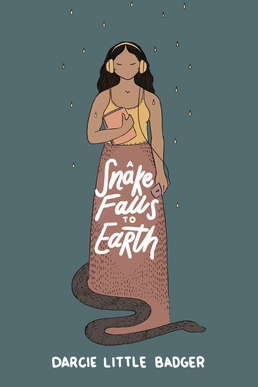
Baba Yaga is a character from Slavic folklore who has two opposite roles. In some motifs she is described as a repulsive and/or ferocious-looking old woman who fries and eats children, while in others she is a nice old woman, who helps out the hero. According to folklorist Vladimir Propp's folktale morphology, Baba Yaga commonly appears as either a donor or a villain, or may be altogether ambiguous. She is often associated with forest wildlife. Her distinctive traits are flying around in a mortar, wielding a pestle, and dwelling deep in the forest in a hut standing on chicken legs.
The Guardian Children's Fiction Prize or Guardian Award was a literary award that annual recognised one fiction book written for children or young adults and published in the United Kingdom. It was conferred upon the author of the book by The Guardian newspaper, which established it in 1965 and inaugurated it in 1967. It was a lifetime award in that previous winners were not eligible. At least from 2000 the prize was £1,500. The prize was apparently discontinued after 2016, though no formal announcement appears to have been made.
'The Sunburst Award for Canadian Literature of the Fantastic is an annual award given for a speculative fiction novel or a book-length collection.
Jane Harris is a British writer of fiction and screenplays. Her novels have been published in over 20 territories worldwide and translated into many different languages. Her most recent work is the novel Sugar Money which has been shortlisted for several literary prizes.
The Center for Fiction's First Novel Prize is an annual award presented by The Center for Fiction, a non-profit organization in New York City, for the best debut novel. From 2006 to 2011, it was called the John Sargent, Sr. First Novel Prize in honor of John Turner Sargent, Sr., and, from 2011 to 2014, the Flaherty-Dunnan First Novel Prize, named after Center for Fiction board member Nancy Dunnan and her journalist father Ray W. Flaherty.
Kiran Millwood Hargrave FRSL is a British poet, playwright and novelist. In 2023, she was elected a Fellow of the Royal Society of Literature.
Sally Green is a British fantasy author. Her work includes the Half Bad trilogy, related short stories, and The Smoke Thieves trilogy. The Half Bad trilogy was adapted into the Netflix series The Bastard Son & The Devil Himself.

Angie Thomas is an American young adult author, best known for writing The Hate U Give (2017). Her second young adult novel, On the Come Up, was released on February 25, 2019.
The Waterstones Book of the Year, established in 2012, is an annual award presented to a book published in the previous 12 months. Waterstones' booksellers nominate and vote to determine the winners and finalists for the prize.
Rebecca F. Kuang is an American fantasy novelist. Her first novel, The Poppy War, was released in 2018, followed by the sequels The Dragon Republic in 2019 and The Burning God in 2020. Kuang released a stand-alone novel, Babel, or the Necessity of Violence, in 2022. Kuang holds graduate degrees in Sinology from Magdalene College, Cambridge and from University College, Oxford, and is currently studying at Yale University.

Baba Yaga is a fictional supervillain in the comic book series Hellboy. Based on the Russian folklore character of the same name, the character was created by Mike Mignola. Baba Yaga was a legendary witch of Russian folklore that lived inside a chicken leg house, and counted dead men's fingers. She appeared in the 2019 film Hellboy, portrayed by Emma Tate and Troy James.

Efua Traoré is a Nigerian-German story writer. She won the regional Commonwealth Short Story Prize in 2018 and was nominated for the Waterstones Children's Book Prize in 2022.

The Rabbit Hutch is a 2022 debut novel by writer Tess Gunty and winner of the 2022 National Book Award for Fiction. Gunty won the inaugural Waterstones Debut Fiction Prize and the Barnes & Noble Discover Prize for the novel.

Babel: Or the Necessity of Violence: An Arcane History of the Oxford Translators' Revolution is a 2022 novel of speculative fiction by R. F. Kuang. It debuted at the first spot on The New York Times Best Seller list, and won Blackwell's Books of the Year for Fiction in 2022 and the 2022 Nebula Award for Best Novel. Thematically similar to The Poppy War, Kuang's first book series, the book criticizes British imperialism, capitalism, and the complicity of academia in perpetuating and enabling them.

Natasha Farrant is a British children's author. In 2020, she won the Costa Book Award for Children's Book for Voyage of the Sparrowhawk.

Sita Brahmachari is a British author known for her work in children's and young adult literature. Her debut novel, Artichoke Hearts, later published in the United States as Mira in the Present Tense, won the 2011 Waterstones Children's Book Prize.
Jacqueline Crooks is a Jamaican-born British writer. In 2023, she was shortlisted for the Women's Prize for Fiction and the Waterstones Debut Fiction Prize.

A Snake Falls to Earth is a 2021 speculative novel by Darcie Little Badger marketed to readers aged 12–18. It falls into the distinct genre of "Indigenous futurism," which includes narratives regarding "the process of ‘returning to ourselves,’ which involves discovering how personally one is affected by colonization, discarding the emotional and psychological baggage carried from its impact, and recovering ancestral traditions in order to adapt in [a] post-Native Apocalypse world."

The Girl Who Speaks Bear is a 2019 middle-grade fantasy novel by Sophie Anderson, illustrated by Kathrin Honesta. Drawing on traditional Russian fairy tales, the story follows 12-year-old Yanka on a quest of self-discovery in a forbidden forest after she wakes up one morning with bear legs. The novel was well-received by critics and won the 2020 Indie Book Award for Children's Fiction.
Sophie Anderson is a Welsh author. Among other honors, her books have been shortlisted for the Carnegie Medal three times.










